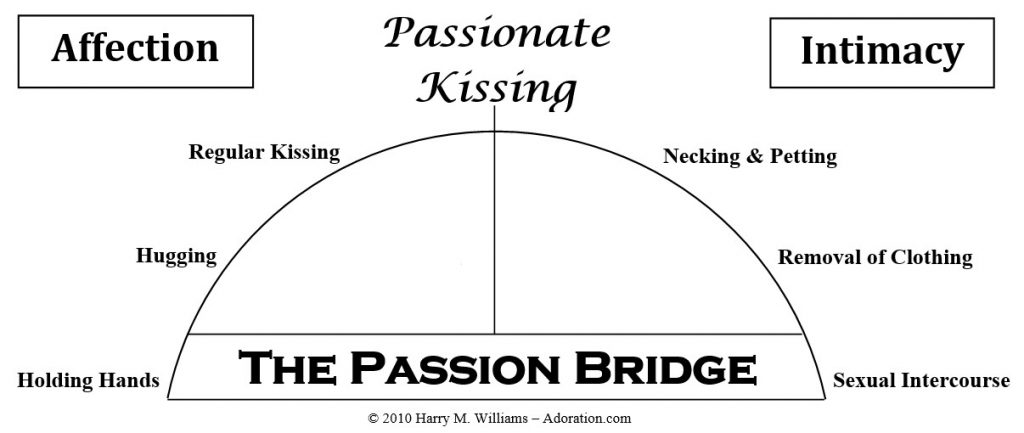The Passion Bridge
The Passion Bridge

In last week’s article, The Unspoken Invitation, I told you there are 3 lessons I think every Catholic girl must be taught before she is allowed to go out on a date with a boy. I covered the first lesson last week: The Unspoken Invitation. This week I want to tell you about The Passion Bridge.
I met my wife Georgette during the summer of 1978, between my junior and senior year in college. Even though Georgette was raised in the Greek Orthodox faith, she was interested in learning about the Catholic faith because most of her cousins on her mom’s side of the family were practicing Catholics.
After we dated for a while, she started asking the typical questions that non-Catholics ask, such as, “Why do Catholics confess their sins to a priest when they can confess them directly to God? Why do Catholics pray to saints when they have the ability to pray directly to God? Why is the Catholic Church opposed to birth control? Does the Catholic Church teach that only Catholics can get into Heaven?”
I didn’t know the correct answers to most of her questions, so during the next two years I read at least two dozen books which covered all the important aspects of the old and new testaments as well as the Catholic faith. At the same time, Georgette learned about the Catholic faith by reading and talking to devout Catholics.
One of the books that I read provided an analysis of each of the Ten Commandments and the subsequent teachings of our Lord. In the chapter that explained the 6th and 9th commandments, the topics of purity and chastity were covered in detail. There was one statement in that chapter that took me completely by surprise. It declared that for unmarried couples, passionate kissing, or what is commonly known as french kissing, is considered a mortal sin (provided the conditions for a mortal sin have been met).
The Pocket Catholic Dictionary defines a “mortal sin” as follows:
An actual sin that destroys sanctifying grace and causes the supernatural death of the soul. Mortal sin is a turning away from God because of a seriously inordinate adherence to creatures that causes grave injury to a person’s rational nature and to the social order, and deprives the sinner of a right to heaven.
According to the Catechism of the Catholic Church, three conditions must be met for a sin to be mortal: (1) a voluntary or deliberate thought, word, or action (2) that is grievously offensive to God (3) which is carried out with full knowledge. (CCC 1857 & 1859). If a person dies while in the state of mortal sin, he or she is denied heaven and is destined to suffer eternal punishment with all the other fallen human beings and angels.
As any 10-year-old who watches television or movies knows, a passionate or french kiss occurs when two individuals engage in a kiss and their tongues touch and/or one of the individual’s tongues enters the mouth of the other individual.
Despite the fact that I attended a Catholic grade school and was raised by and surrounded by devout Catholics, I had never been told that passionate kissing before marriage was a mortal sin. Even after reading about it, I couldn’t believe that the Church would impose such a harsh penalty (eternal damnation) on what appeared to be a harmless activity. So I started searching for an answer as to why the Church would characterize a passionate kiss between an unmarried man and woman as being grievously offensive to God.
What I discovered was that prior to the 1960s, Catholic boys and girls were routinely taught that passionate kissing before marriage was a mortal sin; however, not only did this teaching fall out of favor with the advent of the sexual revolution in the 1960s, it completely disappeared from catechism courses and Catholic books.
It took several years before I was able to understand the logic behind the teaching. There needs to be a clear delineation between what constitutes proper behavior for an unmarried Catholic couple. Without clear guidelines, a couple can unknowingly venture into dangerous and destructive territory. While an unmarried male and female companion are allowed to show affection for each other that includes holding hands, hugging, appropriate touching and caressing, and regular kissing, they are forbidden from engaging in any activity that can lead to sexual arousal.
If you can imagine a large body of land separated by a huge river, the easiest way to get from one side of the river to the other side is by a bridge that connects the two sides. One side of the river is called the “Affection” side and the other side is called the “Arousal” side. While the Affection side of the river can be occupied by both married and unmarried couples, the Arousal side is reserved only for married couples.
Whether an unmarried couple knows it or not, once they engage in passionate kissing, they are automatically transported from the Affection side to the Arousal side. If the couple continues to engage in passionate kissing, they will eventually move on to other activities that are reserved only for married couples, such as necking and petting, inappropriate touching, and sexual intercourse. A young couple rarely crosses from the Affection side to the Arousal side without first engaging in passionate kissing.
For purposes of illustration, here is a visual image of what I’m talking about:
Although there has been no official change in the Church’s teaching that passionate kissing is a grievous sin (if carried out with full knowledge and consent), there is no consensus or discussion among Catholics today that passionate kissing rises to the level of a mortal sin; consequently, many of the people who are reading this may refuse to believe that it is unacceptable for an unmarried couple to engage in passionate kissing. Is it acceptable?
Would you allow your teenage daughter who has never tanned to lie out in the sun between the hours of noon and 3:00 pm on the hottest day of the year without any sunscreen? Of course not. She would end up being badly burned. By the same token, would you allow that same daughter to go out on a date with an man, while dressed in a midriff top and skimpy shorts, without educating her about The Passion Bridge? If you did, she would most likely end up getting burned much worse that she would from lying in the sun.
Just as you would not want your young daughter to violate the laws of nature — regardless of whether she believed that such laws were valid or not — you would not want her to violate God’s laws concerning purity and chastity. Regardless of a person’s beliefs as to whether such laws are valid or invalid, the consequences of not abiding by those laws will always end up causing great suffering. There is no legitimate reason not to share this information with the young Catholic girls who are important to you.





4 Comments
Have learnt, but it is not clear to me, reason being that there was a day I went for confession and I told father that I have kissed a girl, but he told me that, it is not a sin.
[…] covered The Unspoken Invitation and The Passion Bridge. The last critical lesson I believe every Catholic girl must be taught before she is allowed to go […]
Is watching videos of passionate kissing scenes a mortal sin? I am unmarried and have daydreamed about a having a boyfriend and doing romantic things that I see in movies. Since I don’t have one and probably never will, I sometimes watch videos of couples who kiss passionately thinking that I want to learn how to do it (kissing that is) just in case, but in the process and almost naturally I get aroused by watching these. Do you think I committed a mortal sin?
Yes, it very well can be. If a video of passionate kissing happens to come onto the screen during a show or a movie, your watching of it is not necessarily sinful, but your disposition is crucial. It is not bad to desire for communion with another or the outward expressions of tenderness within a relationship. We are built for intimacy and have an innate desire for it. However, what we do to fulfill this desire is where sin can creep in. You must guard your heart and strive for chastity in the proper sense and in an emotional sense. In watching these videos, it seems as though you may be attempting to fill this hole in your heart with an artificial supplement. It is a grasping at affection of sorts. If your vocation is to get married one day, then you will have a chance to learn how to kiss when that day comes. As to whether you committed a mortal sin, it is impossible for anyone to judge except yourself. It would depend on: the gravity of the sin – which is dependent on your disposition, your knowledge of this gravity, and your freedom in choosing to do the wrong. Moving forward, I caution you that in most cases this practice is extremely dangerous and threatens your relationship with Christ greatly, and now that you are aware of this, it is much more likely that it would be a mortal sin if you were to continue in this practice. In the future, look to fill this hole in your heart not through fantasies, through a man on a screen, through figments of your imagination, nor through memories of men from your past, but through an intimacy with Christ. Pray for purity and for a deeper relationship with our Lord. Stay close to the Sacrament of Penance, and receive our Lord in the Eucharist as often as possible (and is allowed by the Church). Please be assured of my admiration of your bravery in reaching out and of my prayers for your continued sanctification.